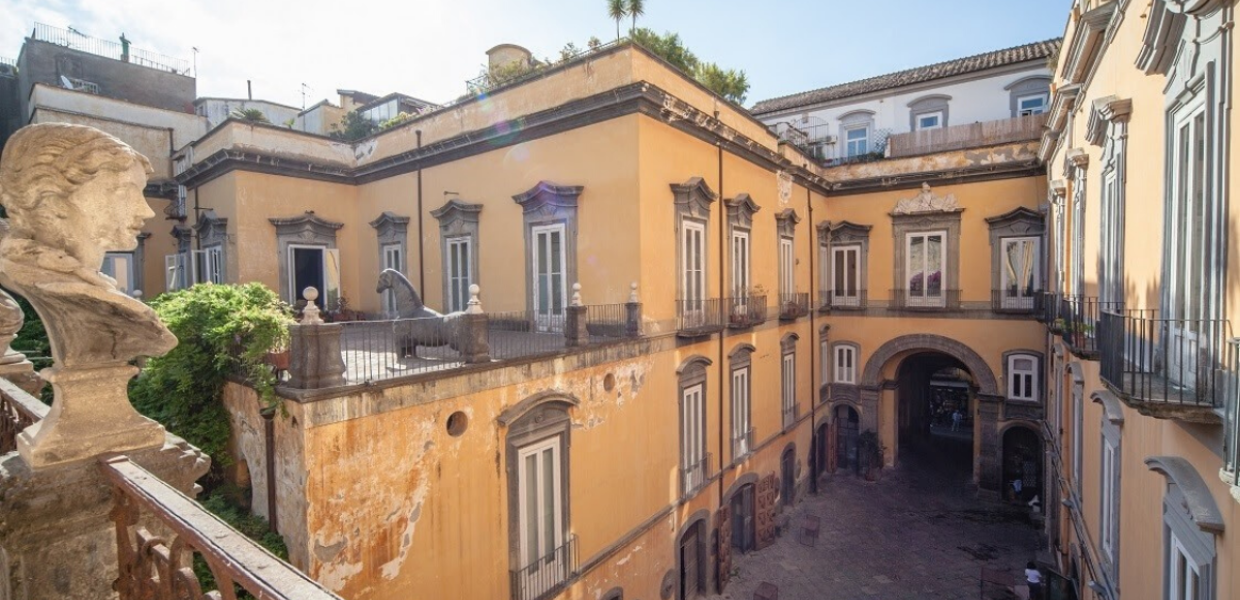An interview with European Historic Houses
As part of our ‘Discovering Europe’ season, we explore initiatives from across the cultural heritage sector that support and highlight cultural tourism locally and further afield. In this post, we interview Marion Ratier, Communications and Cultural Project Coordinator at European Historic Houses. She discusses the online initiatives her association organised during closures caused by COVID-19, and the ongoing relevance of these projects even as some houses begin to reopen.

- Title:
- Palazzo Marigliano, Italy. Participants of the 3rd round of the European Heritage Weeks - Facebook Live Visits
- Date:
- 2020-05-30
- Institution:
- Palazzo Marigliano
- Copyright:
- CC BY-SA
Tell us about the European Historic Houses (EHH).
EHH is an independent, non-profit organisation representing 50,000 private owners of historic buildings, their gardens and parks throughout Europe. Our principal objective is to secure, at the European level, favourable measures for the conservation and the sustainable development of private historic houses.
How did the COVID-19 pandemic affect the members you represent?
The main part of these owners’ incomes comes from visits to their houses and the events they organise in them, and spring and summer are their main income periods. The private heritage sector was very much impacted by the COVID-19 crisis.
How did you support them in sharing their houses and collections with the public when the crisis prevented visitors?
Responding to people’s desire to explore Europe virtually during this period, we decided to make the third edition of our European Heritage Weeks an online project. This initiative began in 2018, when to celebrate the European Year of Cultural Heritage, European Historic Houses organised ‘European Private Heritage Week’ (now called European Heritage Weeks). It brought together 642 houses, who open their doors to half a million visitors in 17 countries under the motto ‘Our House, Your Heritage’. We then organised a second edition in 2019 which, again, was a great success!
To bring this initiative online, we were inspired by Mi Castillo de Arena, a member of one of our Spanish associations, Casas Historicas y Singulares de Espana. They created a virtual journey across Europe through online guided tours of privately-owned historic buildings on their Instagram Live. They contacted us to involve our network, and after the success of this first event, we agreed that EHH could take the project further.
How did you approach sharing the houses online?
We switched from Instagram to Facebook to ensure a wider audience, and organised a number of live, virtual tours of historic houses. We arranged four ‘rounds’ of visits at regular times over several weeks, presenting three houses in three different countries each time, in videos lasting about 15 minutes. We gathered an international audience and the first round of videos had a peak of 253 viewers during the live - which is quite a significant number for the small organisation we are! The 12 participants (owners and/ or managers of the houses) also very much enjoyed the experience.
The 12 videos are still available on our Facebook page and people continue to watch them. By 24 June, our videos had been watched 72,300 times and this number is increasing every day! Encouragingly, some of the participants - as well as other owners who watched the videos - were inspired by this and organised virtual similar events outside of our project. Watch the Facebook lives.
What challenges did you face?
Our main issues were technological. Some of our owners didn’t have the necessary IT skills to manage a Facebook Live, which put us in the role of basic IT teachers in addition to roles as leaders and co-ordinators. And most of these buildings are located in the countryside and they often do not have access to a good broadband connection.
What did you learn from your online experience and how do you plan to incorporate this new knowledge into future activities?
We realised that people from all around the world want to know more about European private historic houses and their owners, including the work needed to maintain these buildings, their history, and the challenges owners face. To share this information, we are now willing to be more active online and to work closely with our members - the national associations of private historic houses - and their members, to make their private heritage accessible as widely as possible.
We are now working on a new virtual project - most likely lasting from September to December 2020 - in which we will introduce two houses per month, linked to themes such as gardens, local production, restoration works and European history. Inspired by our experience in 2020, the fourth edition of our European Heritage Weeks in 2021 will be inaugurated by a live guided tour of one, or several, historic house(s).
How are your members preparing to reopen to the public as travel restrictions relax in some countries throughout Europe?
Many have reopened, following their national restrictions. Some had reopened for locals as soon as the lockdown was lifted in their countries, and before travel restrictions started to be relaxed.
We’ve heard from our members that a lot of people mention the Facebook Live Visits when visiting their houses, so, hopefully, we had an impact on the number of people who will visit European private historic houses this summer, and encouraged people to visit local cultural treasures!


